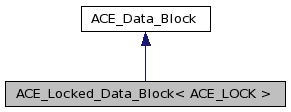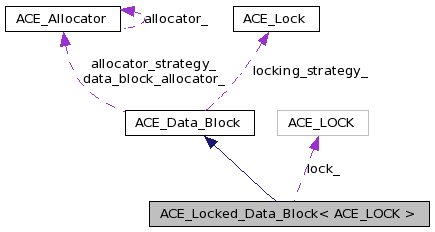A Data_Block with a concrete locking strategy. More...
#include <Message_Block_T.h>


Public Member Functions | |
| ACE_Locked_Data_Block (void) | |
| Default "do-nothing" constructor. | |
| ACE_Locked_Data_Block (size_t size, ACE_Message_Block::ACE_Message_Type msg_type, const char *msg_data, ACE_Allocator *allocator_strategy, ACE_Message_Block::Message_Flags flags, ACE_Allocator *data_block_allocator) | |
| Initialize. | |
| virtual | ~ACE_Locked_Data_Block (void) |
| Delete all the resources held in the message. | |
| virtual ACE_Data_Block * | clone_nocopy (ACE_Message_Block::Message_Flags mask=0, size_t max_size=0) const |
Private Member Functions | |
| ACE_Locked_Data_Block< ACE_LOCK > & | operator= (const ACE_Locked_Data_Block< ACE_LOCK > &) |
| ACE_Locked_Data_Block (const ACE_Locked_Data_Block< ACE_LOCK > &) | |
Private Attributes | |
| ACE_LOCK | lock_ |
| The lock. | |
A Data_Block with a concrete locking strategy.
Data_Blocks can be parametric on the kind of lock they use; in many cases the lifetime of the lock is tied to the lifetime of the Data_Block itself. But since Data_Blocks are reference counted it is hard for users to control the lock lifetime. This class is parametric over the kind of lock used.
Definition at line 38 of file Message_Block_T.h.
| ACE_Locked_Data_Block< ACE_LOCK >::ACE_Locked_Data_Block | ( | void | ) | [inline] |
Default "do-nothing" constructor.
Definition at line 8 of file Message_Block_T.inl.
{
this->locking_strategy_ = &this->lock_;
}
| ACE_Locked_Data_Block< ACE_LOCK >::ACE_Locked_Data_Block | ( | size_t | size, | |
| ACE_Message_Block::ACE_Message_Type | msg_type, | |||
| const char * | msg_data, | |||
| ACE_Allocator * | allocator_strategy, | |||
| ACE_Message_Block::Message_Flags | flags, | |||
| ACE_Allocator * | data_block_allocator | |||
| ) | [inline] |
Initialize.
Definition at line 15 of file Message_Block_T.inl.
: ACE_Data_Block (size, msg_type, msg_data, allocator_strategy, &lock_, flags, data_block_allocator) { }
| ACE_Locked_Data_Block< L >::~ACE_Locked_Data_Block | ( | void | ) | [virtual] |
Delete all the resources held in the message.
Definition at line 17 of file Message_Block_T.cpp.
{
}
| ACE_Locked_Data_Block< ACE_LOCK >::ACE_Locked_Data_Block | ( | const ACE_Locked_Data_Block< ACE_LOCK > & | ) | [private] |
| ACE_Data_Block * ACE_Locked_Data_Block< ACE_LOCK >::clone_nocopy | ( | ACE_Message_Block::Message_Flags | mask = 0, |
|
| size_t | max_size = 0 | |||
| ) | const [virtual] |
Return an exact "deep copy" of the message, the dynamic type is ACE_Locked_Data_Block<> See the documentation in Message_Block.h for details.
Reimplemented from ACE_Data_Block.
Definition at line 22 of file Message_Block_T.cpp.
{
ACE_TRACE ("ACE_Locked_Data_Block::clone_nocopy");
// You always want to clear this one to prevent memory leaks but you
// might add some others later.
const ACE_Message_Block::Message_Flags always_clear =
ACE_Message_Block::DONT_DELETE;
ACE_Locked_Data_Block<ACE_LOCK> *nb = 0;
ACE_NEW_MALLOC_RETURN (nb,
static_cast<ACE_Locked_Data_Block<ACE_LOCK>*> (
this->data_block_allocator ()->malloc (sizeof (ACE_Locked_Data_Block<ACE_LOCK>))),
ACE_Locked_Data_Block<ACE_LOCK> (
max_size == 0 ?
this->size () : max_size,
this->msg_type (),
0,
this->allocator_strategy (),
this->flags (),
this->data_block_allocator ()),
0);
// Set new flags minus the mask...
nb->clr_flags (mask | always_clear);
return nb;
}
| ACE_Locked_Data_Block<ACE_LOCK>& ACE_Locked_Data_Block< ACE_LOCK >::operator= | ( | const ACE_Locked_Data_Block< ACE_LOCK > & | ) | [private] |
ACE_LOCK ACE_Locked_Data_Block< ACE_LOCK >::lock_ [private] |
The lock.
Definition at line 66 of file Message_Block_T.h.
 1.7.0
1.7.0